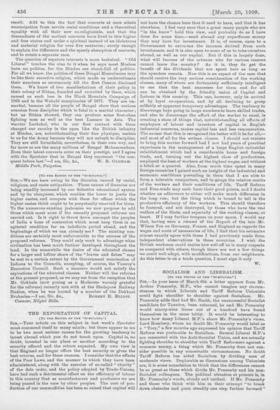THE EXPORTATION OF CAPITAL.
LTO 11111 KllITOR TRH "Spranwroit."] SIR,—Your article on this subject in last week's Spectator must commend itself to many minds; but there appear to me to be two moat serious causes for the growing tendency to invest abroad which you do not touch upon. Capital is, no doubt, invested in one place or another according to the security offered and the return expected. My own view is that England no longer offers the best security or gives the beet returns, and for these reasons. I consider that the effects of the Poor Laws, and the manner in which they have been administered, along with the exercise of so-called " charity " of the dole order, and the policy adopted by Trade-Unions, have had such a detrimental effect on the efficiency of labour in this country that as manufacturers and producers we are being passed in the race by other peoples. The cost of pro- duction of our commodities has been so raised that capital will not have the chance here that it used to have, and that it has elsewhere. I feel very sure that a great many people who are "in the know " bold this view, and probably do as I have done for some time,—send abroad any superfluous money they may have for investment. It is, of course, open to a Government to extra-tax the incomes derived from such investments, and it is also open to some of us to take ourselves abroad, as well as our capital. But if this is largely done, what will become of the artisans who for various reasons cannot leave the country ? As it is, they do get the benefit of the dividends that are spent here as long as the spenders remain. Now this is an aspect of the case that should receive the very serious consideration of the working classes, many of whom are fortunately sufficiently intelligent to see that the best successes for them and for all can be obtained by the friendly union of Capital and Labour in this country. This can, however, only be arrived at by loyal co-operation, and by all declining to grasp selfishly at apparent temporary advantages. The tendency to discourage boys going in large numbers to learn skilled trades, and also to discourage the effort of the worker to excel, is creating a state of things that, notwithstanding all efforts of employers of labour and investors of capital in English industrial concerns, makes capital less and less remunerative. The sooner that this is recognised the better will it be for and most of all for the artisan classes. I should not venture to bring this matter forward had I not bad years of practical experience in the management of a large English industrial establishment which had a considerable home and foreign trade, and, turning out the highest class of productions, employed the best of workers at the highest wages, and without a hitch or a quarrel. Also, from much time spent in many foreign countries I gained such an insight of the industrial and economic conditions prevailing in them that I am able to form a tolerable comparison, and to gauge the relative merits of the workers and their conditions of life. Tariff Reform and Free-trade may each have their good points, and I doubt whether an adherence to either will make much difference in the long run; but the thing which is bound to tell is the productive efficiency of the workers. This should therefore be fostered, and not destroyed, by those who have the real welfare of the State, and especially of the working classes, at heart. If I may further trespass on your space, I would say that, having seen a resume of the Report of the late Mr. Wilson Fox on Germany, France, and England as regards the wages and costs of necessaries of life, I find that his estimates almost exactly agree with those I had previously made from independent observations in these countries. I wish the British workman could realise how well off he is many respects as compared with others, though there are not a few things we could well adopt, with modifications, from our neighbours. As this letter is on a trade question, I must sign it only
W.










































 Previous page
Previous page